Don't miss the chance to work with top 1% of developers.
Sign Up Now and Get FREE CTO-level Consultation.
Confused about your business model?
Request a FREE Business Plan.
How Much Does it Cost to Develop an App like Uber or Careem?
Table of contents
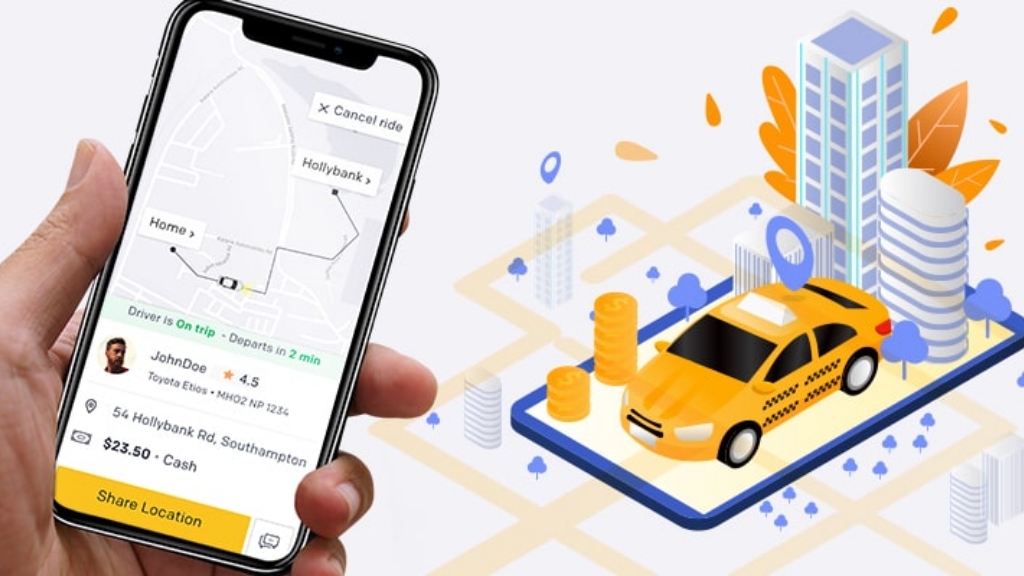
On-Demand Economy is a disruptive innovation created by tech companies that fulfill the needs of customers via immediate supply of goods and services. The economy is revolutionizing the way people demand in cities around the globe.
A number of people ask: Is this an air bubble? A short-term trend? Or a change that is going to fade soon? Confidently and indisputably — the answer is no. The on-demand economy has opened the doors to the fulfillment of goods and services in real-time which customers are embracing with a frequency that is remarkable.
This changing trend will introduce a paradigm shift in our lives which will be quite similar to what was seen after the invention of internet in late 1990s. Today, the on-demand model can be connected to practically every one of the industries.
Take Uber, for example, it began the disruption with an iOS app. At first, Uber could just book the rides for the customers. With time, the company expanded its services and made taxi booking affordable for everyone which was once a royalty.
Today, Uber is available in 78 countries and is completing over 1 million rides every day making its net valuation to more than $72 billion. After winning the taxi market almost all over the world, it is now planning to fly in the sky with UberCopter – an on-demand helicopter service!
So, if you are planning to make an on-demand app like Uber – Go-Ahead – the world is waiting for a new disruption in the on-demand economy every day and is ready to embrace it.
But, first, do a bit research on how these kinda apps work and how much money do you need to create such an app.
How On-Demand Apps Like Uber or Careem Work?
Uber has changed the way world moves and that is not an exaggeration. This California-based company disrupted the market with a fantastic idea. It made spending 10 minutes while looking for a taxi a thing of past while giving pretty much everybody a chance to earn money in their extra time by working as a cab driver. Here is the way it works:
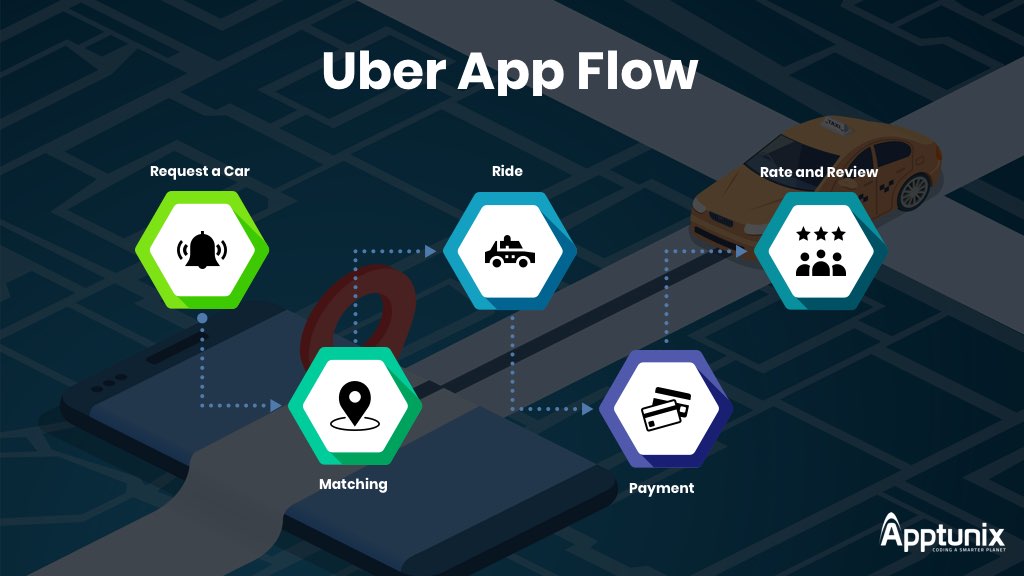
1. Request a Car
Using the application itself, the users can schedule or book
a ride. The request sent by the user will be received by the drivers nearby.
2. Matching
When the drivers see those requests, it is up to them whether
they accept or reject it. If a driver declines the request, then it will be
sent to different drivers.
3. Ride
The users can track the taxi which they booked through a
mapping system in the application. The users can also know the estimated
arrival time of the driver.
4. Pay and Review
The users can see the price they need to pay ahead of the time.
There is more than one approach to pay the driver – in cash or online. This
makes the procedure smoother for drivers as well as for users.
For making their services even better, Uber also has a system
for rating the drivers as well as users.
To know more about How Uber Works, What Is its Business
and Revenue Generation Model, you can head to our in-depth article here.
3 Must-Have Components of an Uber-like App and their Features
So as to make an application like Uber, or a similar on-demand
application, it is essential to understand the major components of the entire
system. Each on-demand application like Uber or Careem depends on the development of two different applications interconnected with the assistance of one admin panel.
Now, let’s see what components are crucial for each part of the service:
-
The customer app
-
The driver app
-
The admin app
Let’s see what features you will require in each of these
apps:
1. Must-Have Features of an Uber-like Customer App
The Uber mobile app for users let them book a taxi ride and pay for it effectively, from the phone screen. To provide customers with a truly advantageous and functional service, the customer part of the taxi app must have the following features:
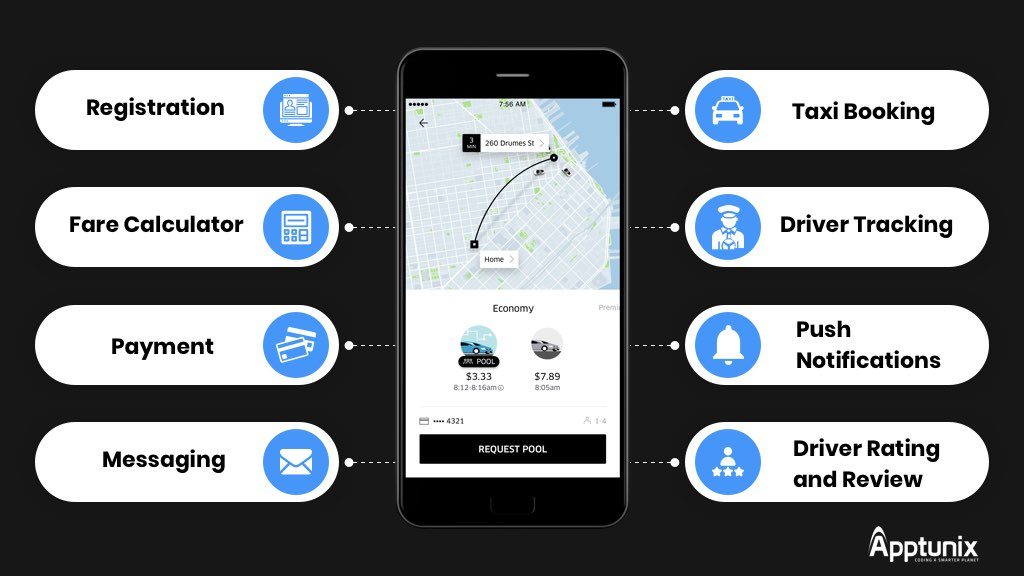
Registration – The registration process in the app
can be done via email, phone number and Facebook with a confirmation. The most
used and preferred way of registering is via social media.
Taxi Booking – It refers to a feature that allows
users to book a cab as per their preferences by entering the location, car
type, and pickup location.
Fare Calculator – The user can check the cost for a
ride ahead of the time if fare calculator is embedded in the app.
Driver Tracking – It is the feature for users to keep
an eye on the driver’s location to see how far he has reached.
Payment – In an app like Uber, multiple
payment methods can be incorporated – in-application payments via credit cards,
services like PayPal, or simply in cash.
Push Notifications – It is one of the fundamental
features of the app which keeps users informed even when they are not using the
app. The features also keep users updated about the driver’s arrival time, car
details and other important information.
Messaging – Incorporating in-app messaging in an
the on-demand app provides users the ability to contact the driver from the
application.
Driver Rating and
Review – Using it,
the users can provide feedback about drivers and their experiences in-app.
Travel History – It shows details of past and upcoming rides.
While there are endless features that you can include in your Uber-like app, the above-mentioned are the ones that are crucial. If you want to add some advanced features then you can think of adding features like Ride Cancellation, Split Payment, Interactive Map, Gamification and voice recognition.
2. Must-Have Features of an Uber-like Driver App
Uber mobile app for drivers allows them to accept the requests and get access to the information regarding the rides they need to complete. Some of the features of Uber’s driver app may be the same as that of customer app like registration, messaging, notifications, reviews, and support.
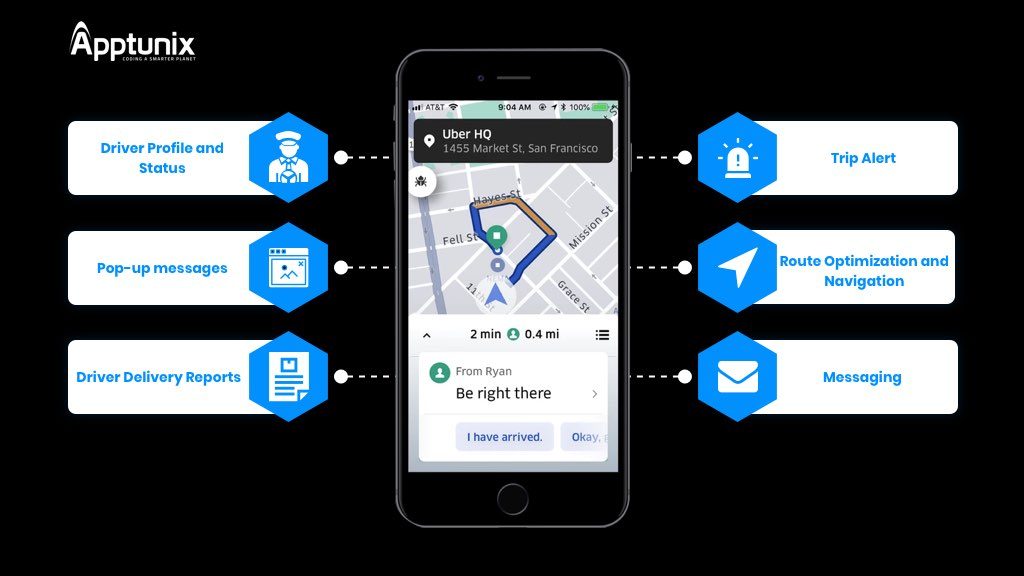
Here is a list of features for Driver’s application:
Driver Profile and
Status –
Verification and profile creation of a driver should be done from the admin
side. The status will let the admin know about the availability of the driver.
Trip Alert – It provides drivers the ability to see
a request by user for accepting or denying the same. It also let them know
about the user’s whereabouts.
Pop-up messages – This feature is used for getting alerts
from the admin side regarding taxi booking information, trip changes, and
completion.
Route Optimization and
Navigation – It suggests
the best route to drivers using Google Maps.
Driver Delivery Reports
– The feature provides
information regarding trips and earnings on a daily or monthly basis.
Messaging – For calling or texting a user from
the application.
Just like the Customer app, there are some advanced features for
the driver’s app as well like Quest Earning, heat map, etc. But, we suggest that
you add these features once your app like Uber becomes stable and get enough
traction in the market.
The good way to develop an app like Uber suggests building an MVP first with all the essential and core features of the app and then adding the advanced features in it to streamline the customer’s experience.
3. Must-Have Features of an Uber-like Admin Panel
The admin side of the on-demand taxi booking application is generally a web application, which is utilized to save, manage, and analyze all the things that are happening in both the applications. It offers an overview of the procedure, shows the best route, manages payroll, and also collects user’s data for marketing purposes. The features of an admin platform for Uber-like app include:
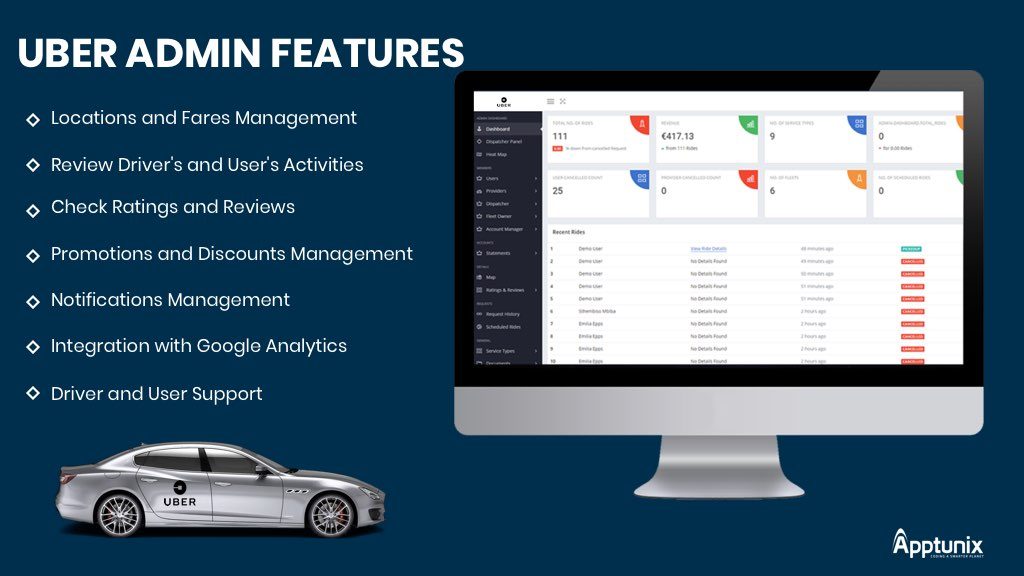
Between all the three applications, there are various shared
features that help answer “how much it costs to make an app like Uber.” Now,
that you know the essential modules of an Uber-like app and the features they
should include, let’s talk about the technologies that you must integrate into
your Uber-like app to get enough traction and good user experience.
Must-Have Technologies for Uber like App Development
The taxi booking app, which wants to repeat the success of
Uber, or just wants to gain the same traction and revenue as Uber, must
integrate some technologies in the app. Without these Uber technologies, the
functioning of the application like Uber would not be imaginable:
1. Geolocation and maps
The ability to locate the passenger and driver in the app allows the service to be fast and accurate. Finding the
right route, measuring the distance and duration of the ride –will be impossible
for the users without Geolocation and maps.
2. Push notifications and SMS
These messages help the passengers come to the cabs timely, and the drivers get to know about the new requests
instantly.
3. In-app payments
Without this feature, the online taxi business would not differ much from taxis on the road. The opportunity to make cashless payments right from the phone screen is one of the top advantages provided by on-demand taxi apps. The set of payment methods available in an application should be credit and debit cards, Google Wallet, Paypal, and Apple Pay.
Now that you know about the technologies that are crucial for
developing an app like Uber, let’s put some spotlight on Tech Stack that Uber
used for developing their robust mobile app.
Tech Stack Used by Uber – an On-Demand Ride Booking App
As Uber’s user base has developed with such a fast speed, they confronted global scaling problems en route. The tech-stack of Uber has hence changed since their first launch and will most likely continue to do, so as to meet the needs of the business.
Here is the tech stack used by the leader of taxi booking
apps – Uber:
1. Programming Languages
As disclosed by Uber, when Uber first began the development of the app, the two
programming languages used were Node.js and Python. However, today the
developers at Uber are also using Go and Java along with Node.js and Python.
Java and Go were selected for high-performance reasons,
particularly Java which takes benefits of the open source ecosystem and is
utilized for integration whereas Go is mainly for efficiency.
2. Infrastructure and Storage
Uber’s business relies on a hybrid cloud model, utilizing a
blend of cloud providers and numerous active data centers. In fact, this is the
key to their success, as if one server falls flat, another takes its position.
To manage this infrastructure, they utilize a blend of internal tools and
Terraform.
They are currently using Schemaless (built in-house on top of
MySQL), Riak, and Cassandra for the same.
3. Routing and Services
Uber is utilizing a Service-oriented Architecture and it depends
on its numerous services to have the option to communicate productively with
one another. To accomplish such they have utilized a combination of HAProxy
which is a free and open source load balancer and HyperBahn which is also an
open source solution build In-House at Uber.
4. Other Technologies
Uber’s tech stack is vast and is created very carefully to
provide a seamless user experience. Along with the above-mentioned
technologies, it also uses the following tech-stack to integrate several
features in its mobile app:
Payment System: Uber’s payment system is equipped
with various technologies and methods. It chose to partner with Braintree, one
of the pioneers in the mobile payment industry, to accept card payments. It
also utilizes PayPal’s Card.io service for card scanning on iOS.
Push Notifications and
Text Messages: Uber
text messages are controlled by Twilio. For push sending notifications in the iOS
application, Uber has utilized Apple Push Notifications Service, and for the
Android application, they have utilized Google Cloud Messaging (GCM).
Geolocation: The Uber application for iOS
utilizes the CoreLocation framework to find a user’s device while for
the Android version they use Google’s Location APIs. Both of them can effectively manage
the operations of an app like Uber.
So, that was all about Uber. If you are planning to make an app like Uber, the tech stack of your Uber clone app should depend on all the emerging technologies and frameworks that would provide a wonderful & secure user experience for all the related partners.

Now that we know all the components of an on-demand taxi
booking application, the must-have features for an Uber Clone App and the tech
stack that supports the working of the application, the time has come to look
at the most significant part – The Cost to Develop an App like Uber.
How Much Does it Cost to Develop an app like Uber or Careem?
When you make an application like Uber, you create three
apps. While every application development company has their own pricing models
for making these applications, there is an uncertainty in the cost of building
up an ‘Uber-like’ mobile application.
Therefore, it is hard to give an exact figure but to have a
rough idea about the estimate, have a look at the following points:
-
For
the most basic variant of the application with just the MVP features and
attractive UI/UX design, the cost can go up to $5,500 for development. -
For
a mix of basic and advanced features, the cost can increase to somewhere in between
$15,000 to $20,000. -
For
the application to be created with all the advanced features that Uber as of
now has, the cost can rise to as high as $80,000 to $85,000.
Also, if you want to get your Uber or Careem like app
developed from us, we also offer free consultation about your business model
and must have features in your Uber-like app. So, to kick-start your app
development project, get a free consultation here.
In Conclusion
The On-Demand Economy Is Developing and not just for the rich and young but also for people who have disruptive ideas in their minds. A brilliant idea that solves customer’s needs and the right execution process to implement the same is all that you need to step into this large and getting larger on-demand economy.

Rate this article!
(6 ratings, average: 4.00 out of 5)
Join 60,000+ Subscribers
Get the weekly updates on the newest brand stories, business models and technology right in your inbox.

Nikhil Bansal is the Founder and CEO of Apptunix, a leading Software Development Company helping startups as well as brands in streamlining their business processes with intuitive and powerful mobile apps. After working in the iOS app development industry for more than 10 years, he is now well-equipped with excellent problem-solving and decision-making techniques.

App Monetization Strategies: How to Make Money From an App?
Your app can draw revenue in many ways. All you need to figure out is suitable strategies that best fit your content, your audience, and your needs. This eGuide will put light on the same.
Download Now!Worried about
development cost?
Pay in EASY and FLEXIBLE INSTALLMENTS.

















